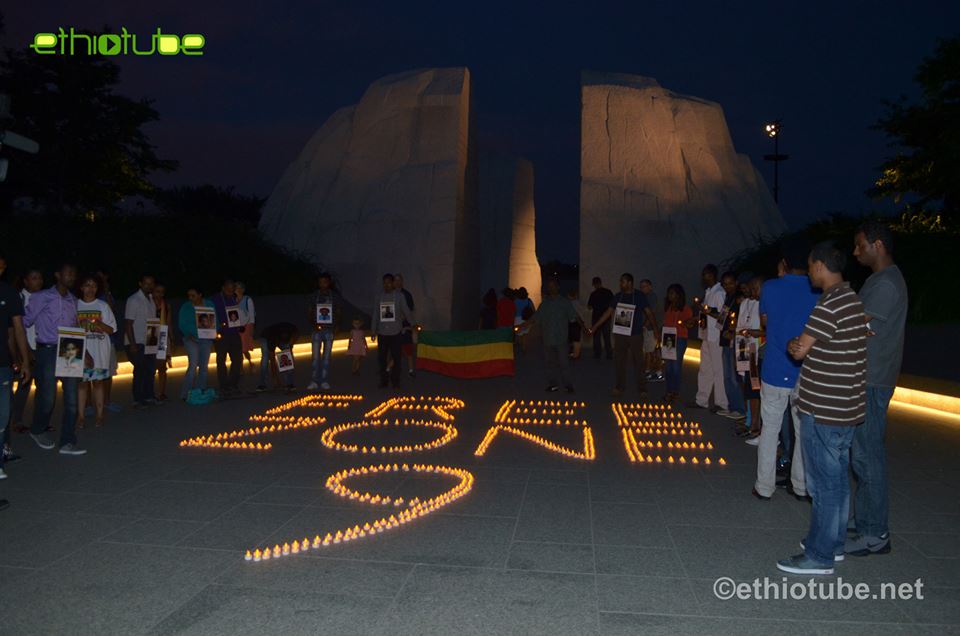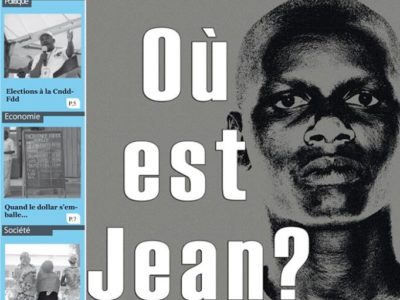
Free Zone 9 Vigil, August 2, 2014. Martin Luther King Memorial, Washington, DC. Photo by EthioTube via Facebook.
What is the state of freedom of expression online in Sub-Saharan Africa? To answer this question, Global Voices's Sub-Saharan Africa Editor Ndesanjo Macha interviewed the Committee to Protect Journalists (CPJ) East Africa Representative Tom Rhodes, from Nairobi, Kenya.
Ndesanjo Macha (NM): Will you please tell us briefly about yourself and your work you with CPJ?
Tom Rhodes (TR): I am the East Africa Representative for CPJ. I monitor and look out for journalists who may be in trouble across this region (East Africa) as well as other areas including the Horn of Africa and parts of Central Africa. Most of our work involves advocacy but we also provide direct assistance in some cases.
NM: How would CPJ rate the level of freedom of expression online in Sub-Saharan Africa?
TR: While the number of blogs and news web sites are growing, seemingly exponentially, the level of suppression of online media is also growing. Generally press conditions are more free online than, say, in print, but this is changing as authorities grow more savvy in finding ways to suppress online critics.
NM: Are there governments in the region that have passed or are intending to pass legislation that would curtail freedom of expression online?
TR: Many of the laws designed to curb cyber-crime or terrorism are also used to curtail online freedom through sweeping language that can be manipulated to silence online critics. Laws in Tanzania and Rwanda for example.
NM: What would you consider the biggest threat to netizens in the region who want to express themselves online?
TR: At the moment it is not the legislation that targets online citizens but arbitrary, often unlawful arrests of netizens that pose the greatest threat. We are all following the trial of six bloggers in Ethiopia – the Zone9 bloggers whose trial has dragged on for over a year without any genuine charges presented over several court hearings. It is increasingly evident that the prosecution had no genuine legal reason to arrest them other than a desire to silence critics ahead of elections. The fact that authorities are targeting bloggers and social media users with arbitrary arrests casts a pall over netizens’ rights to free expression. Social media users in Kenya have also faced arrest over the past 1-2 years. Critical citizen media websites have been blocked in Zambia as well. It is a growing trend as authorities gradually learn the importance and influence of social media.
NM: What are common tactics, apart from legislation, that governments in the region use to limit netizens’ rights to communicate online?
TR: Another tactic more and more governments are using in this region is social media itself. Authorities in Kenya, Tanzania, Rwanda, Ethiopia and elsewhere are hiring staff to react to social media users with counter hashtags and social commentary. One tactic is to flood sites with comments to control the narrative or even induce the site to crash.
NM: There have been numerous examples of blocking of social networking sites and mobile communication during elections and upheavals in the region. Have these tools really empowered citizens in these countries or this is a result of unjustified fears on part of the government?
TR: Burundi and the Democratic Republic of Congo are perfect examples of this. Especially in the case of Burundi – social media acted as a communication tool to help civil society organise the protests in Bujumbura against the president's bid for a third term. The ability to organise and communicate to vast populations through mobile phones should not be underestimated. Sadly, most telecommunication companies are either state-owned or allies to the state and readily cut the signals when commanded to do so. We also saw the same tactics during the 2011 elections in Uganda and Cameroon.
NM: Who are the worst culprits in the region? Can you give some specific examples of what these governments have done?
TR: Perhaps the worst would be Ethiopia where websites are routinely blocked, forcing Internet users to find proxy sites, and bloggers are summarily jailed. Ethiopia has also imported sophisticated online monitoring equipment to spy on its citizens, making online communication challenging. EthioTelecom, the sole telecommunication provider in the country, is owned by the government. All of this is done despite the fact the country has one of the lowest Internet penetration rates in sub-Saharan Africa, if not the world, despite being Africa's second-most populous nation.
NM: Is there a wider social movement in the region pushing for reforms to create a free space of communication, debate and information online?
TR: There appear to be many social movements – including Global Voices!
NM: Many African governments point to pornography and rampant online defamation as chief reasons to limit online expression.
TR: Yes, these are generally the excuses to censor online activity. But how often are court cases and arrests conducted for, say, pornography, in comparison to critical news reporting? I would venture that the latter is far more suppressed than the former.
NM: Are you optimistic about the future of online expression in Sub-Saharan Africa?
TR: Yes, very much so – especially with the burgeoning use of mobile telephones for online access. In 2000, there were roughly 5 million mobile phones in Africa and now there are about 900 million. While many of these phones are not “smart phones” per se – many of them are – and we are seeing more and more mainstream media using citizen's footage and social media to capture in-time reporting to the point where citizens enjoy a more nuanced, holistic narrative of events across the continent.
Tom Rhodes is CPJ's East Africa Representative. Follow him on Twitter at @africamedia_CPJ.



